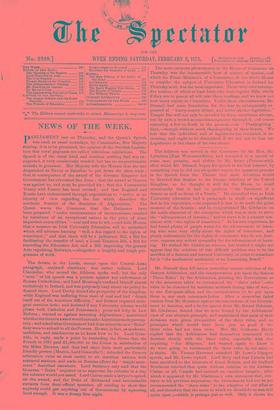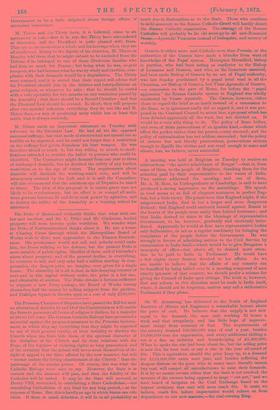Mt. Disraeli then fell into a somewhat minute criticism of
the Geneva Arbitration, and the interpretation put upon the famous Three Rules' by the Arbitrators, pressing the Government as to the measures taken to recommend the "three rules "—the rules to be observed by maritime neutrals during time of war,— to our European allies, and the interpretation to be put upon them in any such recommendation. After a somewhat faded oration from Mr. Horsman against the concessions of our Govern- ment to America, and a feeble speech from Mr. Bernal Osborne, Mr. Gladstone denied that we were bound by the Arbitrators' view of any abstract principle, and maintained that most of their decisions were given irrespective of the three rules, and on principles which would have been just as good if the three rules had not been there. But Mr. Gathorne Hardy replied that the Arbitrators had themselves connected their decision closely with the three ' rules, especially with that requiring "due diligence," and wanted again to know if we were going to recommend the three rules in our sense or in theirs. Mr. Vernon Harcourt attacked Mr. Lowe's Glasgow speech, and Mr. Lowe replied. Lord Bury said that Canada had been sacrificed to the interests of Great Britain, and Sir Stafford Northcote retorted that quite without relation to the Alabama Claims at all, Canada had secured an excellent bargain ; after which it appeared by Mr. Gladstone's own statement that, con- trary to his previous impression, the Government had not as yet recommended the "three rules" to the adoption of our allies at all, and therefore that the sense in which we should do so was still quite open ;—which is perhaps just as well. Only it shows the Government to be a little shipshod about foreign affairs of secondary importance.



































